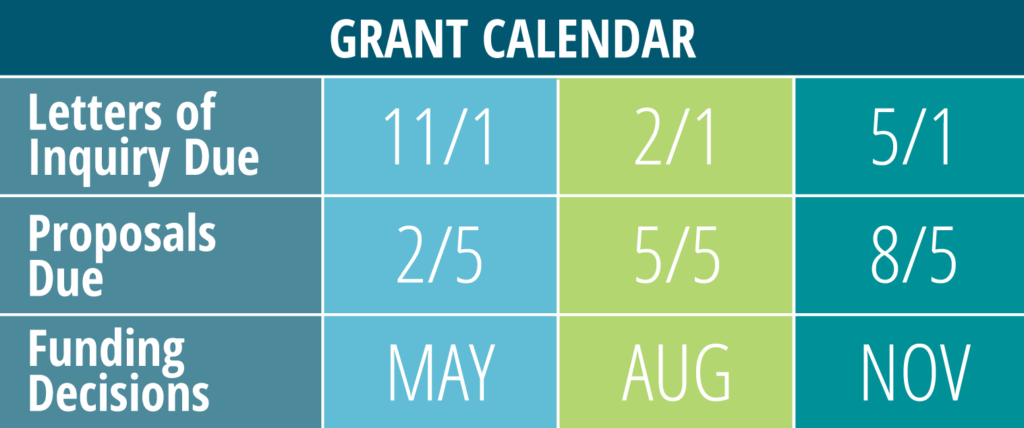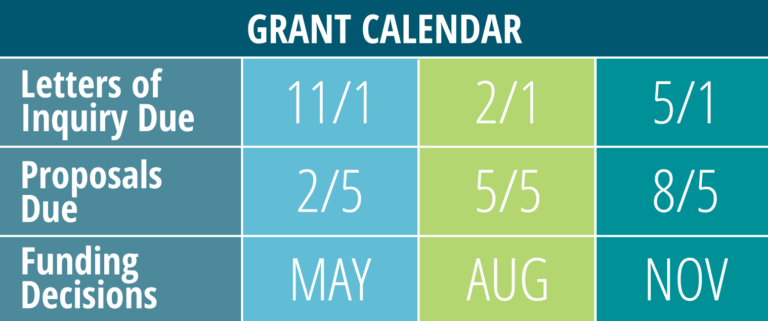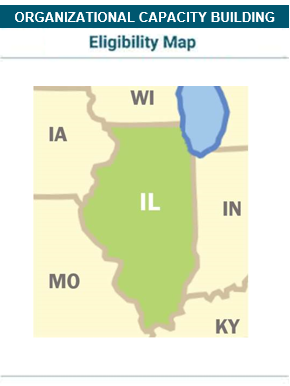
Organizational Capacity Building Grants
RRF awards OCB grants to help Illinois nonprofits that serve older people make fundamental improvements to key management systems and governance. These grants may be used for specific capacity building activities that include, but are not limited to:
Board Development
Communications and Marketing
Evaluation
Fundraising
Human Resources
Information Technology Improvements
Internal Operations / Financial Management
Organizational Strategy Planning
Strategic Program Planning
*See descriptions of OCB-funded activities here.
Standard OCB Grants
RRF provides Standard OCB Grants to help Illinois nonprofits make long-term improvements in their management, governance, or organizational capacity. Standard OCB funds generally support consulting, training fees, information technology, and other costs directly related to capacity building activities. Applications for Standard OCB Grants coincide with the Foundation’s regular grantmaking cycles.
Standard OCB Grants are provided to nonprofit organizations that:
- are located in Illinois
- have been in operation for at least three years and have annual revenue of at least $75,000
- place a high priority on providing services to people, age 60 and older
General Grant Exclusions
RRF generally does not fund:
- Projects that are not intentionally focused on older people, age 60 and above
- Projects outside of the United States
- Grants to individuals
- Lobbying
- General operating expenses or support for ongoing programs without significant changes in strategy or focus
- Biomedical research, basic theory development for social science research, or research and development for new technology
- Construction of facilities, capital improvements, or computer equipment
- Conferences, publications, or production of films and videos unless they are integral components of a larger project
- Dissertation research, tuition expenses, or education programs for undergraduate or graduate students
- Endowments, capital campaigns, or fundraising events
- Private foundations
- Financial deficits
All applicants are required to submit a Letter of Inquiry (LOI) before being invited to submit a full grant proposal. Please reference the Grant Calendar below to determine the next deadline.
While RRF’s previous LOI process involved submitting Word or PDF documents, the new process will consist of completing an online form, including a series of written prompts. You can watch an instructional video walkthrough of our application process here.
Organizations may submit only one Letter of Inquiry per deadline. Common exceptions include LOIs submitted by separate departments of large universities. It is recommended that you check with your colleagues and/or development staff prior to submission to ensure only one LOI is submitted.
LOIs will be accepted no later than 11:59 PM (CT) of the deadline day. If the deadline falls on a weekend or holiday, LOIs will be accepted as late as 5:00 PM (CT) the following workday.
RRF will review LOIs and respond to applicants approximately six weeks after the LOI submission deadline. Applicants invited to submit a full proposal have one year after the LOI deadline to submit.

RRF requires interested applicants to submit a brief Letter of Inquiry (LOI) prior to submitting a full proposal. RRF will then invite applicants whose work appropriately aligns with RRF’s priorities and other funding considerations to submit a full proposal. Those that are not invited need to wait a year before submitting another LOI for the same project.
The LOI must be submitted online.
If you have already submitted an LOI in the past year, please contact us for further instructions.
We highly recommend you prepare your responses offline before moving to the online submission portal and copy/paste your responses in the appropriate fields.
The following information will be requested in the LOI submission process:
- Organizational Information
- Legal Name, Employer ID Number (EIN)
- Address, Phone Number
- Current Fiscal Year Budget
- Contact Information
- Name, Office Address, Email, and Office Phone Number for the project’s Primary Contact and the organization’s Primary Contact
- Project Information
- Project Title
- Brief Project Description (1-2 sentences)
- Estimated Length of Project, Project Start and End Dates
- Estimated Total Project Cost, Amount of Funding already Secured (if applicable)
- Amount Requested of RRF
- RRF grant pathway (Advocacy, Direct Service, Professional Education & Training, Research, or Organizational Capacity Building) that best describes your proposed project.
- RRF priority area (Caregiving, Housing, Economic Security in Later Life, or Social and Intergenerational Connectedness) your project addresses. Select only the primary area. If your project does not directly align with a Priority Area, you are welcome to submit an idea for consideration as an “Other Promising Project.”
LOI Written Prompts
Statement of Need and Proposed Solution
- Provide a brief (no more than 2 paragraphs – approximately 350 words) statement about the primary issue the project will address, how you intend to address it, and why this project is needed at this time. If you indicated that your project falls into the category of “Other Promising Projects,” use this space to discuss how your project: presents a promising opportunity to advance the field of aging; addresses a time-sensitive and urgent issue; promotes a new opportunity for collaboration; or promotes positive perceptions of aging.
Goals and Objectives
- Tell us the overarching Goals and SMART(IE) Objectives of your project. You should have no more than 1-2 goals, and each goal should have no more than 3-4 objectives. You may use bullet points in this section.
Target Population
- Provide a description of the target population, including number of people your project will reach/effect, how you will reach the population (recruitment), and demographic information or geographic location where relevant. This description should be no more than 1 paragraph – approximately 150 words.
Diversity, Equity, Inclusion (DEI) Lens
- In two to three sentences, please describe how your organization will bring a DEI lens to the proposed project. If your project does not have a DEI focus, write “N/A.”
- RRF’s definition of Diversity, Equity, and Inclusion can be found on RRF’s Frequently Asked Questions webpage.
Methods
- Please describe the specific methods you will use to accomplish your goals and objectives. No more than 2 paragraphs – approximately 350 words.
- For an organizational capacity building project, define the proposed activities and how they will be accomplished.
Evaluation and Impact
- Discuss your evaluation criteria and methods, this section should include expected outcomes and a brief statement on dissemination where applicable. This section should be no more than 1-2 paragraphs – approximately 200 words.
- For organizational capacity building (OCB) projects, discuss how this work will impact your organization.
- To learn more about the important components of evaluation plans, we highly recommend reading “How Do Foundations and Funders Approach Evaluation and Impact?” from the Summer 2024 edition of the American Society on Aging’s Generations.
Organizational Qualifications/Partners/Stakeholders
- Include information on who is leading the project, their qualifications, and partner organizations/stakeholders that will be involved. OCB projects should include project consultant(s) and a description of how they were selected. No more than 2 paragraphs – approximately 350 words.
Prospective Project Budget
- In a few sentences, describe how you generally anticipate RRF funds being used to support your proposed project (i.e., supporting costs for personnel, consultants, program materials, technology, dissemination activities).
Once these materials are prepared, you may move on to the next step of completing your LOI application online.
Once you have prepared the materials referenced in Step 3, you may submit your Letter of Inquiry using RRF’s online grant portal.
Before you Start a New LOI:
Please read the following instructions carefully before accessing RRF’s online portal. RRF recommends printing or saving these instructions for reference when continuing work on our online LOI form.
Google Chrome will not function properly with RRF’s grant portal. You must use another Internet Browser to prevent compatibility issues while applying, such as Firefox, Safari, or Microsoft Edge.
To begin a new LOI, click the button below. Be sure to click on this button only ONCE, as clicking more than once will result in multiple blank application forms.
If this is the first time you are using RRF’s online portal, you will need to click on the New Applicant? Button located below the E-mail field to create a new account.

Once you sign in or create an account, a new LOI form will be created. When you finish a section of the form, click on the “Next” button displayed at the bottom of the screen to continue to the next section. If you need to stop working on the form before it is complete, click on the “Save & Finish Later” button, so that you can return to the application at a later date. We highly recommend saving your application regularly (every thirty minutes) to avoid timeout errors.
![]()
If Continuing an LOI:
To continue working on an RRF LOI, click on the button below.
Please note, inactive applications will be purged from our system following 120 days of inactivity.
If you have multiple application forms listed, please delete each blank, unneeded form by clicking on the trash can icon displayed to the right of the application form’s listing in your online account.
If you encounter issues or have any unanswered questions, please contact RRF Foundation for Aging at 773-714-8080 or via email.
If you are invited to submit a full proposal, you will be sent an email with detailed instructions on the application process.
Applicants invited to submit a full proposal have one year after the LOI deadline to submit. Example – For a LOI submitted on the November 1st deadline, an invited applicant has three deadlines to submit a full proposal:
- February 5th
- May 5th
- August 5th
Proposals will be accepted no later than 11:59 PM (CT) of the deadline day. If the deadline falls on a weekend or holiday, proposals will be accepted as late as 5:00 PM (CT) the following workday.
In addition to reviewing and updating any project details outlined in your Letter of Inquiry, you will be asked to prepare the following materials as individual Word/Excel documents.
Formatting Guidelines:
- Kindly use a 12-point Arial font.
- Word documents should be single-spaced with 1” margins.
- The Executive Summary, Proposal Narrative, Budget Narrative, and Timeline are to be uploaded as Microsoft Office documents (.doc/.docx or .xls files).
- The Budget should be uploaded as a Microsoft Excel file.
- Please note that, except for the Executive Summary and Bios/Resumes, there is no page or length restriction.
- The Executive Summary is a separate two- to three-page summary that concisely describes the project. The Executive Summary offers a succinct overview of your project and allows RRF to understand what you are trying to accomplish. Include brief information about the project’s need, objectives, methods, time frame, total cost, and the amount requested from RRF.
- The Proposal Narrative provides an opportunity for you to describe your project thoroughly to RRF by addressing the following:
- Organizational Background
- Mission, history, community, and population served
- Evidence that your organization places a high priority on services for older people
- Information regarding the Board of Directors, including business/community affiliations; percentage of members who made financial contributions; and the total Board contribution made in the last fiscal year
- Project Description
- Capacity issue to be addressed
- Why the project is needed at this time
- Steps already taken to address this issue (if any)
- Project Goals and SMART(IE) Objectives
- Concisely state the goals of your project and list Specific, Measurable, Attainable, Realistic, and Time-bound (SMART) objectives to achieve the goals. If you are proposing a project that is intentionally focusing on equity and inclusion you may want to include Inclusive and Equitable language in your objectives (IE). For more information, read RRF’s Guide on Developing SMART-IE Objectives
- Include anticipated outcomes and/or accomplishments
- Describe how the project will improve your organization’s ability to serve older constituents
- Proposed Methods
- Workplan with activities placed in priority order
- How staff, board, and other stakeholders will be engaged in the project and prepared for the changes that may occur as a result of the project
- If applicable, information regarding the consultant(s) for the proposed project, including description of bid, interview, and selection processes
- Personnel
Capacity building projects generally involve a working team of staff, board, and volunteers. Please describe:- Who will oversee the project
- Who will serve on your project team and their responsibilities related to the project
- How existing staff involved in the project will handle their responsibilities in addition to their current duties
- If applicable, other staff the organization intends to engage for the project
- Evaluation
- Describe how you will measure progress toward objectives
- Identify quantifiable indicators you will use to gauge progress
- For recommendations on creating evaluation plans, we highly recommend reading “How Do Foundations and Funders Approach Evaluation and Impact?” from the Summer 2024 edition of the American Society on Aging’s Generations
- Plans for Continued Support
- If the proposed capacity building activities require additional funding after the grant ends, indicate your organization’s plans for securing additional funds
- OCB Coaching
If a grant is awarded, the services of an OCB coach may be available. These services are provided in addition to the grant award. See a description of the role a coach can play in a capacity building project. If your organization is interested in a coach, please respond to the following:- How your organization could benefit from the services of a coach
- Particular issues you would like the coach to address
- Any concerns you may have about working with a coach
- Organizational Background
- The Budget, Budget Narrative, and Timeline will be uploaded as three individual Microsoft Office documents. While RRF does not require a standard form for these documents, samples are provided for illustrative purposes. You may use more than one page for each document.
- The Line Item Budget includes all expenses and income, including grant funds requested from RRF and funds received and/or requested from other sources for this project, if any. Please include the percentage of time allocated for project staff. Up to 10% of the funds requested from RRF may be allocated for indirect project costs. See RRF’s Budget Sample.
- The Budget Narrative describes how the budget relates to the proposed project activities. Budget narratives generally contain a description for each line item identified in the budget, explaining how the request amount was computed. See RRF’s Budget Narrative Sample.
- The Timeline corresponds directly to the activities that are described in the proposal. See RRF’s Timeline Sample.
- In addition to the documents listed above, you will also be asked to upload:
- IRS 501(c)(3) designation letter or other evidence of federal non-profit status
- Most recent audited financial report (preferred) or most recent IRS 990
- Current operating budget showing income and expenses
- Minutes from the last three Board meetings. Upload in one file
- If applicable: Bios or Resumes of no more than 2-3 pages for the project director(s), key personnel, and consultants
- If applicable: Project bid from consultant(s)
- If applicable: Signed memoranda of understanding or detailed project bids from consultants that may be involved with the project
Once your application materials are completed, you can access our online grantee portal via our “Continue an Application” button.
If you encounter issues or have any unanswered questions, please contact RRF Foundation for Aging at 773-714-8080 or via email.
The due dates for all grant reports are listed on page four of the RRF Grant Award Letters sent to applicants who are awarded grants.
Grantees will submit their reports electronically via the applicable report form(s) uploaded into the grantees’ RRF Online Applications and Requirements accounts. Grantees will receive an email notifying them when the applicable report form(s) have been uploaded into their account. In addition, they will receive instructions about how to access the forms via an RRF Online Applications and Requirements Account.
Documents describing the information to be included in the grant report(s) may be accessed via the links below:
OCB Flexible Fund Grants
RRF provides OCB Flexible Fund Grants to respond to immediate capacity building needs for Illinois nonprofits that serve older people. OCB Flexible Fund Grants are available to help organizations identify their capacity building priorities or receive short-term technical assistance:
Readiness Assessments – Funds may be used to engage a consultant who will work directly with an organization to identify and prioritize capacity building opportunities, and the steps needed for organizational improvement or growth.
Targeted Consultations – Funds may be used to engage an expert in nonprofit management to provide short-term, focused technical assistance on an emerging issue related to legal, fiscal, human resources, or other areas.
Applications for OCB Flexible Fund Grants are accepted on a rolling basis throughout the year. Funding requests must be $5,000 or less. Decisions on OCB Flexible Fund Grants are generally made within four to six weeks.
OCB Flexible Fund Grants are provided to nonprofit organizations that:
- are located in Illinois
- have been in operation for at least three years and have annual revenue of at least $75,000
- place a high priority on providing services to people, ages 60 and older
General Grant Exclusions
RRF generally does not fund:
- Projects that are not intentionally focused on older people, age 60 and above
- Projects outside of the United States
- Grants to individuals
- Lobbying
- General operating expenses or support for ongoing programs without significant changes in strategy or focus
- Biomedical research, basic theory development for social science research, or research and development for new technology
- Construction of facilities, capital improvements, or computer equipment
- Conferences, publications, or production of films and videos unless they are integral components of a larger project
- Dissertation research, tuition expenses, or education programs for undergraduate or graduate students
- Endowments, capital campaigns, or fundraising events
- Private foundations
- Financial deficits
Please review the Foundation’s eligibility requirements and exclusions before beginning the application process.
OCB Flexible Fund Grants are accepted on a rolling basis throughout the year.
We recommend you review and complete the required application components outlined in the Apply section before beginning an online application form.
RRF requests that all proposals include the components outlined below. You will upload each of these documents as individual files via our online application.
To respond to immediate capacity building needs for Illinois nonprofits, RRF has a streamlined application process for its OCB Flexible Fund program. Please note that:
- Applications for OCB Flexible Fund Grants are accepted on a rolling basis throughout the year
- Funding requests must be $5,000 or less
- Decisions on OCB Flexible Fund Grants are generally made within four to six weeks
The OCB Flexible Fund Application is available electronically as an online application form.
Please provide the following in your application:
- Short-term need to be addressed
- Amount requested and how the funds will be used
- A brief paragraph describing what assistance you seek and how you believe an OCB Flexible Fund grant would support your organization (upload as a Microsoft Word file)
- Project bid or scope of work from proposed consultant
Attachments – Please include the following:
- Minutes from the last three Board Meetings (attach as one file)
- IRS 501(c)(3) designation letter
- Most recent audited financial statement
RRF has an online process to submit grant requests.
Please read the following instructions carefully before beginning a new online application. RRF recommends printing or saving these instructions for reference when continuing work on an application.
A. How to Create an RRF Online Application Account and Start an Application:
- Google Chrome will not work properly with RRF’s grant portal. You must use another Internet Browser to prevent issues while applying, such as Firefox, Safari, Internet Explorer, or Microsoft Edge.
- Only click on this button ONCE to login or create your RRF Online Application Account and create a form for a new application. Clicking on this button more than once will result in multiple blank application forms.

- Select Continue an Application in the sidebar if you want to continue working on an in-progress application.

- The first time you apply, you will need to click on the New Applicant? button located below the E-mail field to create your account.

- Once you sign in or create an account, a new online application form will be created. When you finish a section of the form, click on the Next button displayed at the bottom of the screen to continue to the next section. If you need to stop working on the form before it is complete, click on the Save & Finish Later button, so that you can return to the application at a later date. We recommend saving your application regularly (every thirty minutes) to avoid timeout errors.

B. Tips for Continuing to Work on an RRF Online Application:
Please note inactive applications will be purged from our system following 120 days of inactivity.
To continue working on an RRF online application form, click on the Continue an Application button.
If you have multiple application forms listed, please delete each blank, unneeded form by clicking on the garbage can icon displayed to the right of the application form’s listing in your online account.
If you encounter issues or have any unanswered questions, please contact RRF Foundation for Aging at 773-714-8080 or via email.
The due dates for all grant reports are listed on page four of the RRF Grant Award Letters sent to applicants who are awarded grants.
Grantees will submit their reports electronically via the applicable report form(s) uploaded into the grantees’ RRF Online Applications and Requirements accounts. Grantees will receive an email notifying them when the applicable report form(s) have been uploaded into their account. In addition, they will receive instructions about how to access the forms via an RRF Online Applications and Requirements Account.
Documents describing the information to be included in the grant report(s) may be accessed via the links below:
Things to Know


Learn about general grant exclusions, search our FAQs, watch an instructional video on our application process, read evaluation guidelines and learn how to develop SMART objectives.




